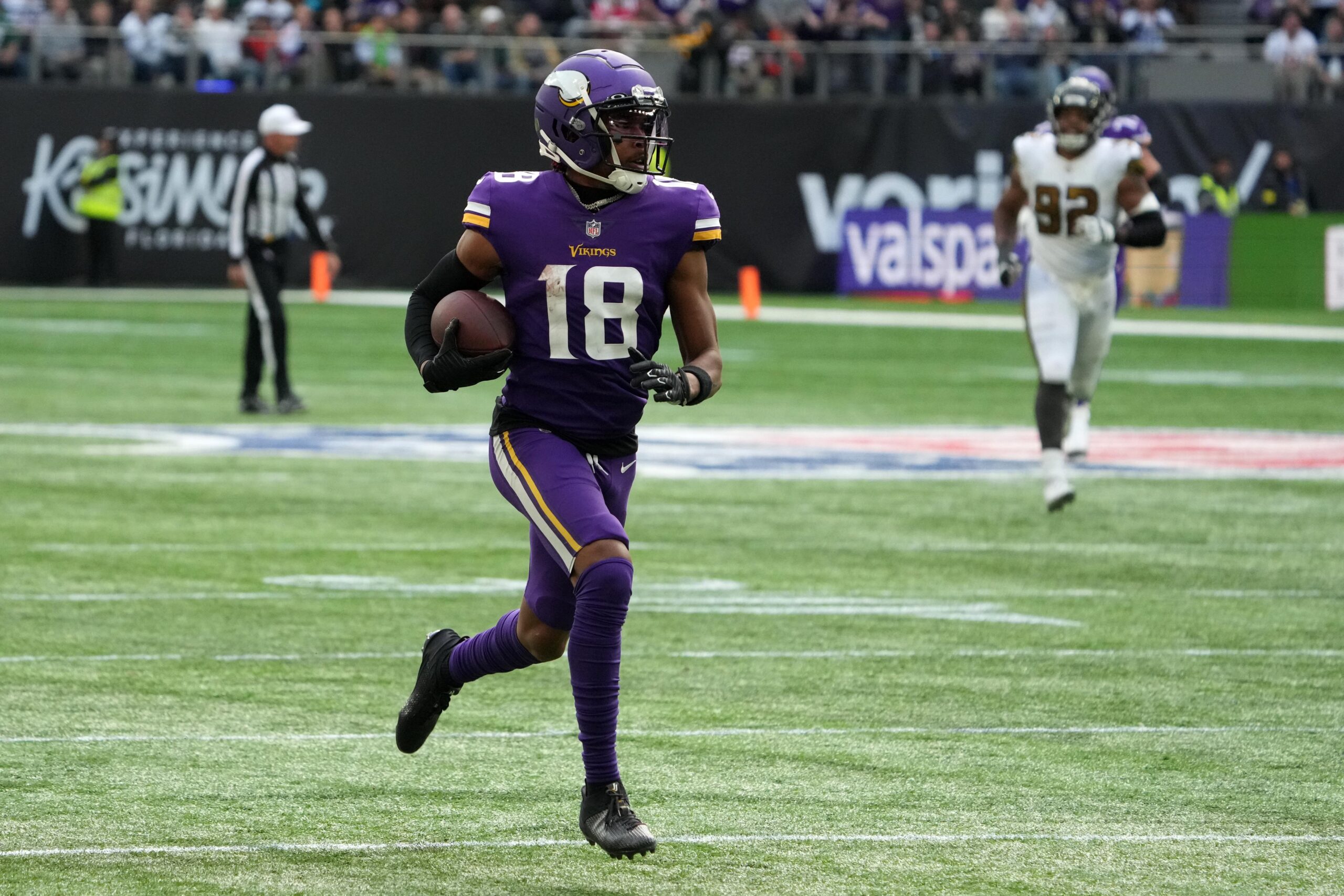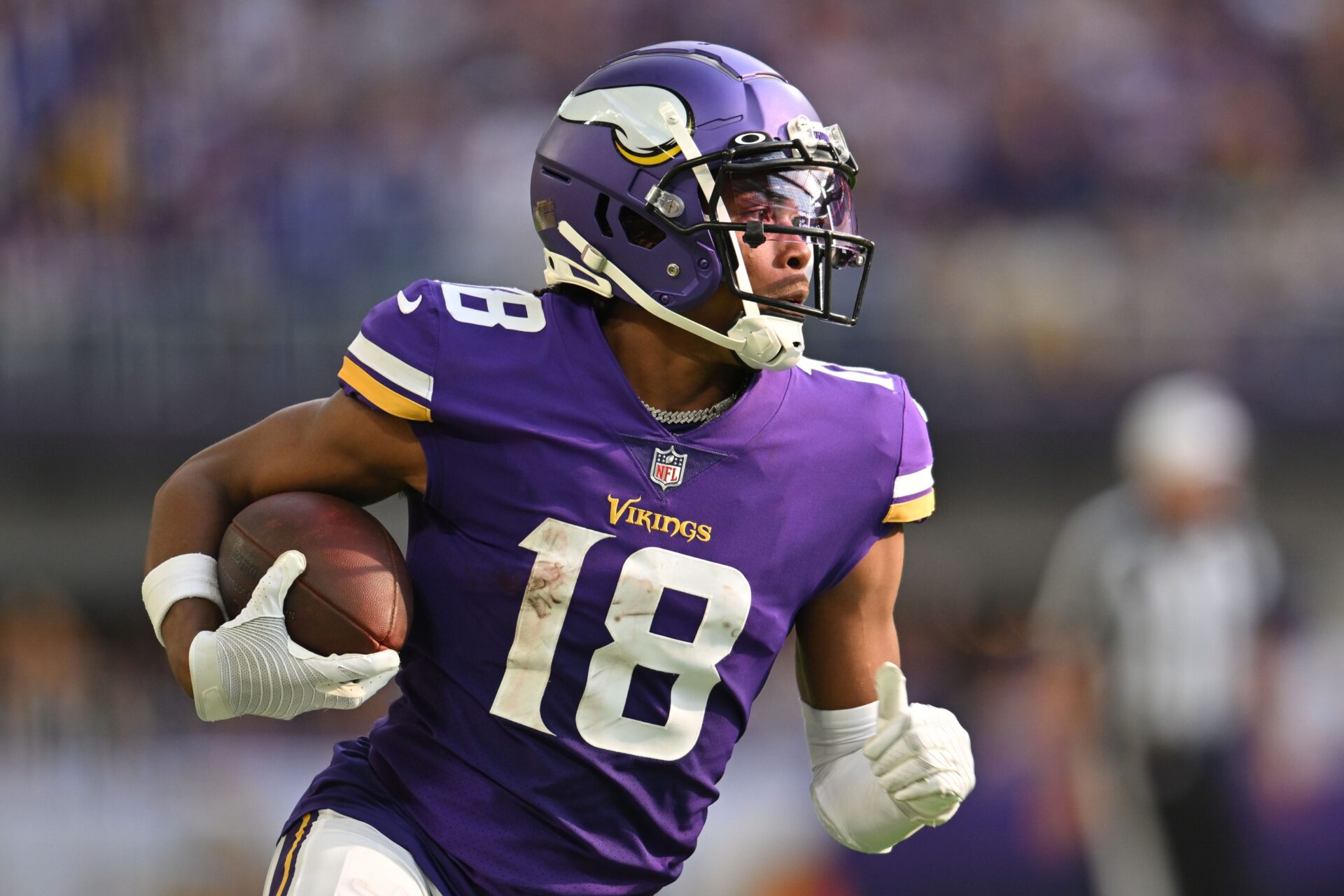Justin Jefferson is on a path to making more money than any other wide receiver in history. The question is how long he waits until he gets there. The Minnesota Vikings are enabled right now to extend Jefferson and sign him to a long-term deal, locking up one of the best players to come through the franchise since Adrian Peterson.
Despite that, there doesn’t seem to be a deal on the horizon. Mike Florio at Pro Football Talk reports that there’s “plenty of noise” that the Vikings are content waiting before extending Jefferson. It’s unusual, but does it hurt the Vikings?
Justin Jefferson Isn’t Holding Out
It doesn’t look like Jefferson plans on playing hardball with the franchise, either, and he shared that he wasn’t going to hold out in minicamp or training camp in order to secure a better deal.
That’s consistent with his previous behavior, too. This time last year, Jefferson remarked that he was “not too fond of money” when asked if he was excited to see big receiver salaries around the NFL that could inflate the value of his next deal.
Jefferson doesn’t dislike money — he was excused from a portion of minicamp because he was in Miami meeting with sponsors, and he’s taken on a number of endorsement deals in his short time in the league. He even has his own expansive and updated line of merchandise, which he constantly wears and promotes. Jefferson didn’t become the first NFL player to be included in Fortnite for free.
The fact that he could earn more from endorsements than the dollar value of his contract might help make negotiations relatively easy.
But he still wants to avoid ending up in a situation where the Vikings are underpaying him. That might mean just walking away from the negotiating table and taking his talents to free agency without worrying about holdouts or other kinds of drama.
The problem with that approach, from his perspective, is that the Vikings have risk-free control over his contract at a relative discount. They not only have him under contract for 2024 under the parameters of the fifth-year option, but they could also franchise tag him several years in a row and would be getting him at a relative bargain.
After all, the franchise tag averages the top salaries at the position, and Jefferson arguably deserves more than any of those players.
That kind of control and leverage might make it tough for Jefferson to really play hardball in negotiations.

The Minnesota Vikings Shouldn’t Overplay Their Hand
With something like three years of control, the Vikings might be able to win the upper hand in any contract talks. But it would be dangerous to exercise; the Vikings struck a bargain with Danielle Hunter and are now locked into a stalled negotiation with the disgruntled pass rusher. Underpaying Jefferson or overplaying their hand could backfire on them, so they don’t want to drive too hard of a bargain.
That means they don’t want to use their current negotiating window to attempt to underpay him too much but don’t want to rely on their leverage later in the negotiation process to hold him hostage.
Waiting has its benefits, of course. They wouldn’t be liable for any guaranteed money if Jefferson’s play drops off or an injury impacts his career, and they might be able to steal a year or two of his career they wouldn’t otherwise have well below his market rate.
But if they wait until March to discuss a contract extension with Jefferson, the price will likely only ever go up — that’s why teams strike deals with players before their contract comes up. Jefferson is likely to put together another elite receiver season, and additional deals with high-level receivers will come through the transaction wire, pushing Jefferson’s value up.
The scenarios where his price goes down, like underperformance or injury, present risks to the Vikings. An injury big enough to hurt his contract expectations could also be a source of resentment for Jefferson, which seems to be a relevant consideration in the Hunter holdout.
Jefferson, in a world with no security attached to his contract, might change his tune on the way he interacts with the team if he finds his future put at risk. That’s why creating an environment of security for the receiver might be the smartest play for the team.
For Jefferson, it might be prudent to wait it out. He knows that even though the team has three years of control following this season, he can command a good deal after another successful year. His decision to avoid holdouts now might really just mean he’s demonstrated good faith as a negotiator in the run-up to his contract, but he could begin deploying more aggressive leverage later on in the bargaining cycle.
By waiting, the Vikings run the risk of alienating a receiver who is willing to play ball in the negotiating room while also ramping up the potential cost of an extension. But the risk is likely pretty small, and they might avoid going too far in the other direction by underpaying him with an early extension.
The most likely outcome is that the Vikings pay Jefferson a little bit more than they already would have, but the differences are likely not that important after accounting for cap expansion and the ability to restructure contracts.
It’s unusual, but it’s probably not a big deal.

